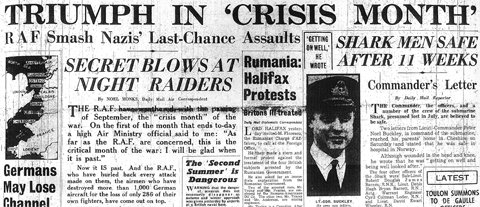
Noel Monks, air correspondent of the Daily Mail, is in a confident mood today (1). He is essentially declaring victory for the RAF in the Battle of Britain:
THE R.A.F. have weathered with the passing of September, the “crisis month” of the war. On the first of the month that ends to-day a high Air Ministry official said to me: “As far as the R.A.F. are concerned, this is the critical month of the war: I will be glad when it is past.”
Now it IS past. And the R.A.F., who have hurled back every attack made on them, the airmen who have destroyed more than 1,000 German aircraft for the loss of only 286 of their own fighters, have come out on top.
He even goes so far as to say that today will be a turning point in the war, even if there is not much air fighting. This is because it is now clear that the Luftwaffe wasted its best chance to deliver a ‘knock-out blow to the R.A.F.’s southern bases’ (1, 6):
They had the driest August in 100 years, and September has been the finest for almost as long. Yet the knock-out blow was not delivered.
It can now be definitely stated that the German Air Force have lost their chance to knock out the R.A.F. With their numerical superiority, there was a good chance of at least a partial success. That chance goes by the board to-day.
His reasoning is as follows (1):
(1) New types of fighters and bombers, with which the Nazis have nothing to compare, are ready to go into action at once;
(2) The time has come when the R.A.F. can afford to take more offensive tactics, and
(3) The new weapon which will prove to be the answer to the random bombing of London by night is about to be brought into use.
The Mail has a weekly ‘agony aunt’ column, written by Ann Temple. And there’s certainly plenty of agony to go around these days. J.D. writes in to ask for advice about his wife, ‘to find the right note with her’ (4):
My wife’s parents were killed in an air raid along with our eldest child, who was sleeping with them at the time. My wife can’t get over it. She doesn’t want to go on living.
Our three remaining children are young and need her attention. She has never failed any of them, and has always been a grand wife to me. I have tried every way to cheer her up, so have the children, but she doesn’t notice us and goes on doing things listlessly.
Temple’s advice is ‘Don’t hurry her’.
Suffering such as this just can’t be shared. She can feel nothing at present but despair at the loss of her father and mother, and of her first-born. But after a while she will begin to feel the loss of her child as your child too and the other children’s companion. And their claims on her and yours will pull at her again, strong and real and healing.
We’ll likely never know if J.D.’s wife did, as Temple predicted if her advice was followed, ‘find the will to live and the strength to endure’.
I could use some advice myself. How should this letter be understood (3)?
SIR, — I understood we were going to meet force with force. What is murdering women and children but force? — E. James, Colchester.
The way I read this is that the Germans are murdering British women and children; therefore Britain should respond in kind and start murdering German women and children. In almost so many words. If this is what James means, then it’s the bluntest call for unlimited war against civilians I’ve seen so far in the British press, with no hiding behind euphemisms like ‘reprisals’, let alone ‘military objectives’.
![]() This work is licensed under a Creative Commons Attribution-NonCommercial-NoDerivatives 4.0 International License.
Permissions beyond the scope of this license may be available at http://airminded.org/copyright/.
This work is licensed under a Creative Commons Attribution-NonCommercial-NoDerivatives 4.0 International License.
Permissions beyond the scope of this license may be available at http://airminded.org/copyright/.


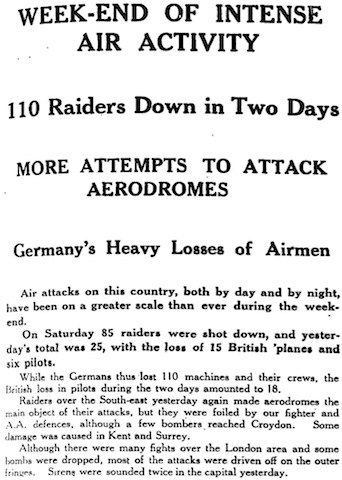
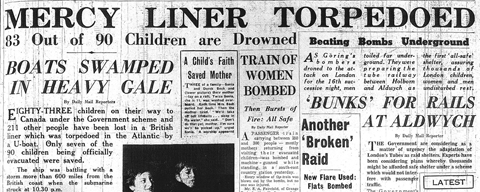
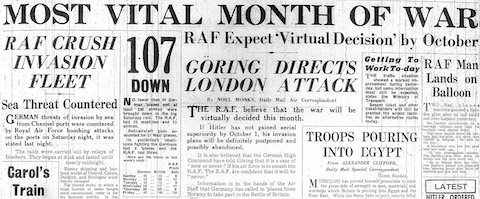
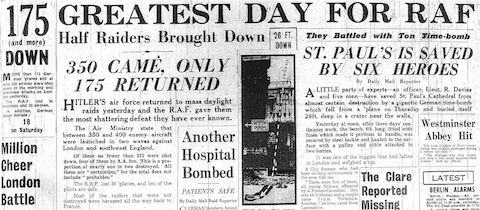
I too am struggling to grasp what E James meant Brett.
The clearest point that he or she made is that ‘murdering women and children’ is ‘force.’ Which is unarguable, I suppose. While I think your explanation the most likely one, it is possible to read it that he or she thought that the use of force had gone on long enough and objected to the British continuing to use it.
Of course, newspapers don’t always print letters because they consider them models of clarity and close reasoning. Almost anything is possible. For example, E James may have been the secretary of a golf club that the letters editor was trying to join.
Pingback: Airminded · Tuesday, 1 October 1940
Also, the letters editor is supposed to edit the letters for ‘clarity and brevity’; sometimes the latter conflicts with the former! That might be the case with the Daily Mail, which only published very short letters; either its readers were not capable of stringing more than two or three sentences together or they are being severely cut down. The Times and the Manchester Guardian published many (perhaps all) of their letters in full, so that’s less of a problem. But editing might still have altered the meaning here and there.
Pingback: Airminded · Post-blogging 1940: preliminary thoughts and conclusions